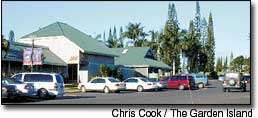Jeff Stone could hardly hide the excitement in his voice. In a telephone interview with The Garden Island last week, the 46-year-old part-owner of Princeville Resort explained from his office at the Ko Olina Resort on O‘ahu how he, Morgan
Jeff Stone could hardly hide the excitement in his voice. In a telephone interview with The Garden Island last week, the 46-year-old part-owner of Princeville Resort explained from his office at the Ko Olina Resort on O‘ahu how he, Morgan Stanley, and the Hawaii Land Development Corporation, now Princeville Associates, came to buy the famed property.
“When people think of Hawai‘i, they think of a place like Kaua‘i,” he said. For his partners, it was the right property at the right time, he said. “Princeville is ‘old Hawai‘i,'” he said. “It’s a canvas that remains unharmed.”
Stone said he’d like to keep it that way.
Meanwhile, Starwood Hotel & Resorts will continue to run the hotel at the same time they pursue construction of 184-unit timeshare villas in Princeville for Starwood Vacation Ownership. Construction could happen as soon as this winter.
There’s talk that Starwood might purchase the hotel it presently manages. If so, it would be consistent with a strategy employed by Stone at his Ko Olina Resort on Oahu, where the Ihilani Hotel was sold to JW Marriott and the undeveloped land sold for development as homes and time shares.
The three Japanese partners who presently own the resort had been fishing for buyers for some time, Stone said, but they were hard-pressed to find one who would be interested in long-term ownership and development of the property, yet remain honorable to the Japanese owners’ vision. They found it in Princeville Associates, Stone said.
“There was no bidding, and no one bid against us. It was a matter of honor,” he said.
Stone said that they sat down with the Japanese owners only just recently and, to everyone’s surprise, found that their philosophies were similar: community input, controlled growth, marketing to a wealthy clientele, care and concern for the land, and an honorable relationship between management, owners and employees.
“I was surprised they chose us,” he said.
Stone said the Japanese were heartbroken about selling, and that two of Suntory’s executives will probably continue living in their Princeville homes.
“You wouldn’t believe how much the owners agonized over the sale of this property, which they loved,” Stone said. “They sent letters to all the employees explaining why they were selling. When you think about it, 15 years is a long time to own that property.”
Meanwhile, Morgan Stanley had approached Stone some time ago looking for a unique property on which to cut their teeth in Hawai‘i.
The purchase marks the first time Morgan Stanley has invested in Hawai‘i. They wanted the right type of property and a local partnership before making any moves, Stone said.
“Morgan Stanley loves Kaua‘i,” he said. They also love Princeville’s target market: wealthy people from the U.S. mainland looking for the quintessential Hawaii getaway.
Unlike the Ko Olina Resort on the west-side of O‘ahu, Stone said the Princeville Resort will not require the development of any artificial attractions to draw clients. “Bali Hai and Hanalei Bay are already attractions enough,” Stone said.
Stone recently got the go ahead to build an “aquarium” to attract visitors to the Ko Olina resort. In exchange for salvaging the failing resort, the state deferred for 10 years the transient accommodations tax, among other things — breaks that amount to $75 million.
He was offered no tax breaks to purchase Princeville, and he didn’t ask for them, he said.
Development at the resort will start with employee housing and renovations to the Princeville Shopping Center.
They expect to pump millions into the economy here and building could start by early next year, he said.
There won’t be any large “growth-spurts” right at the start, but a gradual development, driven by zoning restrictions, community input and market demand, Stone said.
“It’ll be slow, methodical. There will be no boom town. And over the next 10 years, we’ll be asking ourselves if certain development will add the right type of jobs.”
Back in the 1960s, it was hoped that Princeville would have 4,000 hotel rooms and 7,000 homes. But over the last two decades, changes in ownership, hurricanes and an unstable tourism economy has kept it far below that, with 252 rooms, a few hundred private homes and about a thousand condominiums.
Stone is a self-described local boy, having spent his youth between Hilo and the Mainland. With no college degree, Stone can be called a self-educated man, having learned much of his profession from his father, a real-estate developer.
“What happens to Princeville will be a process involving the community, county and us as the stewards. We’ll come together and figure it out together. It’s all going to be good,” Stone said.
Phil Hayworth, business editor, may be reached at 245-3681 (ext. 251) or phayworth@pulitzer.net.


